Cognitive Bias
Kainan Jarrette and Diana Daly
What is Cognitive Bias?
Cognitive bias is the systematic ways our minds can lead us to misjudge, misunderstand, or ignore information. This is a largely unconscious process, which means:
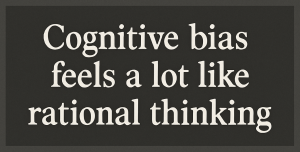
It’s also important to note that everyone has some degree of cognitive bias — yes, even you. That’s because, in terms of our evolution as a species, some of these biases were adaptive, meaning they served a useful purpose for our survival.
Some cognitive biases operate through heuristics: mental shortcuts our brains use to quickly make decisions. But where some of these shortcuts may have helped us thousands of years ago, they can often be an active hindrance in the modern world.

Here’s an example:
If you were an early human and saw someone get mauled by a tiger, it was probably more safe and useful to just adopt a mentality of “I need to avoid all tigers.” But in the modern world, if you saw someone with blonde hair attacking someone else, it probably wouldn’t be useful to adopt a mentality of “I need to avoid all people with blonde hair.”
Other cognitive biases are a result of factors ranging from our emotional responses, to the limitations of our memory, to the many social influences in our life. But in each case, cognitive bias hinders our ability to assess the truth of the world.
Types of Cognitive Bias
There are many different types1 of cognitive bias, but we’ll cover three of the most common:
Confirmation Bias
Confirmation bias is the tendency to look for, notice, and believe information that supports what you already think, while ignoring or dismissing information that challenges your beliefs. It’s basically like viewing the world through tinted glasses (but without realizing you’re even wearing glasses).
 Let’s say you have a belief that dogs are friendlier than cats. As you go about your daily life, you’ll probably tend to mostly notice friendly dogs and grumpy cats, and ignore instances of grumpy dogs and friendly cats.
Let’s say you have a belief that dogs are friendlier than cats. As you go about your daily life, you’ll probably tend to mostly notice friendly dogs and grumpy cats, and ignore instances of grumpy dogs and friendly cats.
This bias is a result of having evolved in a world with an overwhelming amount of stimuli (sensory information) — far more than we can process at one time. As a result, your brain tends to only process the information it thinks is important, a process called selective attention. And what it tends to think is important is whatever information aligns with things you’ve already experienced.
You and Your Brain
This book will sometimes refer to “your brain” doing certain things, as that usually makes the concepts we’ll be covering easier to talk about. But it’s important to remember that, at the end of the day, you are your brain.
So, when we talk about “your brain” doing something in this book, we’re using it more to reference the unconscious mechanisms of the brain.
Motivated Reasoning
Motivated reasoning is the tendency for people to process information in a way that reaches a conclusion they want to be true. You can also think of motivated reasoning as being emotional thinking that wears the mask of rational thinking.
Whereas confirmation bias is more about consistency, motivated reasoning is more goal-oriented.
 Let’s say you take a test that you feel you aced, but when you get the test back, you actually did much worse than you thought. You start to immediately feel that it wasn’t actually your performance that was the problem, it must have been that the test was unfair. And further, you find yourself ignoring evidence that the majority of the class did well on the test (meaning it likely wasn’t unfair). That’s motivated reasoning at work.
Let’s say you take a test that you feel you aced, but when you get the test back, you actually did much worse than you thought. You start to immediately feel that it wasn’t actually your performance that was the problem, it must have been that the test was unfair. And further, you find yourself ignoring evidence that the majority of the class did well on the test (meaning it likely wasn’t unfair). That’s motivated reasoning at work.
This type of bias is most intense when it involves issues of your personal or group identity. Personal identity is how you view yourself as an individual, while group identity is how you view yourself in the context of a group you feel you belong to.
Identity is an incredibly strong motivator because it gives us a sense of stability and meaning. Our brains are wired to protect that sense of who we are and where we belong, even if that’s not beneficial to us in the long-term.
Given this, when you encounter information that involves your sense of identity, you should be especially on guard for your biases.
The Illusory Truth Effect
The Illusory Truth Effect is the tendency to believe something is true simply because we’ve had repeated exposure to it. This effect is so powerful that it can still work even when we’ve been told the information is false.
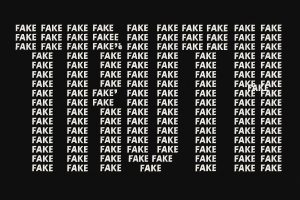
Repetition tends to make it easier for our brains to process something (as it literally takes less energy2). When something becomes easy to process, we develop a preference for it, and it feels good. When information feels good, we tend to assume it’s true.
Heard It All Before
This is why, in marketing3, repeated exposure is very important (up to a point4). This same concept is true of misinformation. People or groups who are trying to actively and intentionally spread misinformation will repeat those falsehoods at every opportunity. (And social media platforms now do a lot of the work of repetition on their own, through algorithmic recommendations5).
One of the best defenses against this is to focus on the epistemology we discussed in the previous chapter. When you think about a belief, ask yourself “why do I believe this is true?” If your only answer is “because I’ve heard it a lot” you should probably investigate that belief a little further.
No cure, just management
Here’s the reality: none of us will ever be able to fully remove our biases, because the brain is simply built to have them. The goal, then, isn’t to rid ourselves of biases, but to manage them.
Successful management involves these components:
- Building a mental system to notice when these biases may be happening
- This can be done through developing and strengthening metacognition, which is the awareness and understanding of one’s own thought processes. In simpler terms, it’s “thinking about thinking.”
- Counteracting those biases once you notice them
- There are many ways to do this, including:
- Diversifying your sources of information
- Fact-checking content as soon as you’re exposed to it
- Slowing down and reflecting on the content before just absorbing it
- There are many ways to do this, including:
- Knowing which areas in life are most important to do the above
- There are lots of instances where you don’t need to worry about all of this. For example, if you’re trying to decide which flavor of ice cream you want to buy, you’re probably safe to just go with your gut. But in other instances, such as building beliefs about how the world works, you probably want to be on guard for your biases.
A Cognitive Arms Race
In the modern world, there are a wide variety of groups and individuals that are actively looking to take advantage of people’s cognitive biases: advertisements, media, politicians, etc. The advent of more recent technologies has made this even easier to do. Most social media platforms, for instance, are specifically designed6 to take maximum advantage of people’s cognitive biases.
The good news is that critical thinking is a great way to build up your mental defenses so that it’s more difficult to have your biases fall victim to manipulation!
TL;DR
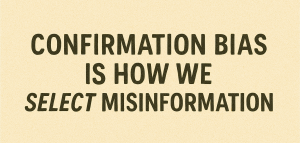
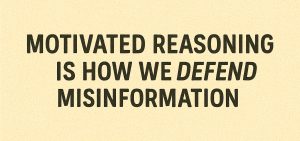
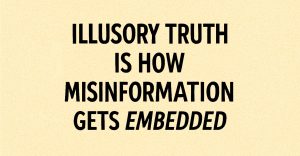
Chapter quiz and short essay
Knowledge Check: Cognitive Biases
Short Essay: Cognitive Biases
Vocabulary
cognitive bias
the systematic ways our minds can lead us to misjudge, misunderstand, or ignore information
confirmation bias
the tendency to look for, notice, and believe information that supports what you already think, while ignoring or dismissing information that challenges your beliefs
group identity
how you view yourself in the context of a group you feel you belong to
heuristics
mental shortcuts our brains use to quickly make decisions
metacognition
the awareness and understanding of one’s own thought processes
motivated reasoning
the tendency for people to process information in a way that reaches a conclusion they want to be true
personal identity
how you view yourself as an individual
selective attention
processing only stimuli deemed to be important while ignoring stimuli deemed to be irrelevant
References
1 Wikipedia contributors. (n.d.). List of cognitive biases. Wikipedia. https://en.wikipedia.org/wiki/List_of_cognitive_biases
2 Dunst, B., Benedek, M., Jauk, E., Bergner, S., Koschutnig, K., Sommer, M., Ischebeck, A., Spinath, B., Arendasy, M., Bühner, M., Freudenthaler, H., & Neubauer, A. C. (2014). Neural efficiency as a function of task demands. Intelligence, 42(100), 22–30. https://doi.org/10.1016/j.intell.2013.09.005
3 Hekkert, P., Thurgood, C., & Whitfield, T. W. A. (2013). The mere exposure effect for consumer products as a consequence of existing familiarity and controlled exposure. Acta Psychologica, 144(2), 411–417. https://doi.org/10.1016/j.actpsy.2013.07.015
4 Betts, K. R., Aikin, K. J., Kelly, B. J., Johnson, M., Parvanta, S., Southwell, B. G., Mack, N., Tzeng, J., & Cameron, L. (2019). Taking Repeated Exposure into Account: An Experimental Study of Direct-To-Consumer Prescription Drug Television Ad Effects. Journal of health communication, 24(5), 503–511. https://doi.org/10.1080/10810730.2019.1609139
5 Denniss, E., & Lindberg, R. (2025). Social media and the spread of misinformation: Infectious and a threat to public health. Health Promotion International, 40(2), daaf023. https://doi.org/10.1093/heapro/daaf023
6 Center for Humane Technology. (n.d.). Social media and the brain. https://www.humanetech.com/youth/social-media-and-the-brain
Media Attributions
- Rational Thinking Text © ChatGPT is licensed under a CC0 (Creative Commons Zero) license
- The Tiger and the Blonde © ChatGPT is licensed under a CC0 (Creative Commons Zero) license
- Cats and Dogs (Happy and Grumpy) © ChatGPT is licensed under a CC0 (Creative Commons Zero) license
- Test Outrage © ChatGPT is licensed under a CC0 (Creative Commons Zero) license
- Illusory Truth © Kainan Jarrette is licensed under a CC0 (Creative Commons Zero) license
- Cognitive Bias Text 01 © ChatGPT is licensed under a CC0 (Creative Commons Zero) license
- Cognitive Bias Text 02 © ChatGPT is licensed under a CC0 (Creative Commons Zero) license
- Cognitive Bias Text 03 © ChatGPT is licensed under a CC0 (Creative Commons Zero) license
the systematic ways our minds can lead us to misjudge, misunderstand, or ignore information
mental shortcuts our brains use to quickly make decisions
the tendency to look for, notice, and believe information that supports what you already think, while ignoring or dismissing information that challenges your beliefs
selecting and focusing on particular stimuli while simultaneously suppressing irrelevant or distracting information
the tendency for people to process information in a way that reaches a conclusion they want to be true
how you view yourself as an individual
how you view yourself in the context of a group you feel you belong to
the tendency to believe something is true simply because we've had repeated exposure to it
false, inaccurate, or misleading information
the study of how we know what we know
the awareness and understanding of one's own thought processes
the practice of carefully analyzing information, beliefs, and arguments in order to make well-reasoned decisions, form justified beliefs, and avoid being misled

